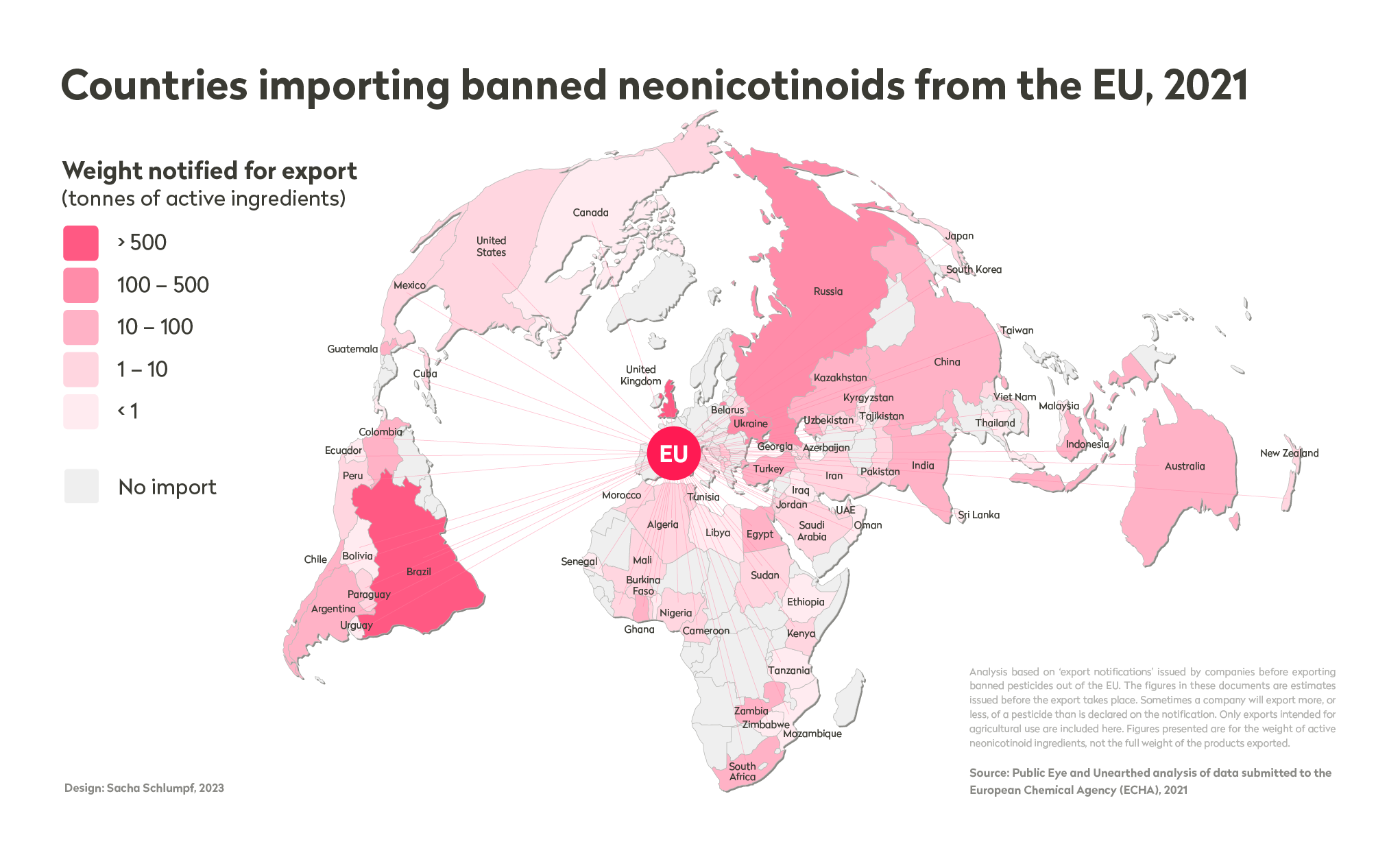EU exporting over 10,000 tonnes of banned bee-killing pesticides a year, investigation finds
Zurich, Lausanne, May 17, 2023
The European Union issued plans to export more than 10,000 tonnes of banned bee-killing pesticides in just one year to mostly poorer countries, according to an investigation by Unearthed, Greenpeace UK’s investigative unit, and the Swiss NGO Public Eye. The findings come ahead of World Bee Day (20 May).
These neonicotinoids, or neonics, are prohibited from use in EU fields but continue to be exported in vast quantities, causing untold damage to pollinators and the wider ecosystem. This is the first time the full scale of exports from the EU has been revealed.
13 exporters revealed
The investigation showed that companies issued plans to export 13,274 tonnes of neonic-based pesticides from 13 EU countries in 2021. By far the biggest exporters were Belgium, France, Spain and Germany. Other countries that played significant roles include the Netherlands, Austria, Hungary, Greece and Denmark.
Nearly half of this toxic payload was destined for Brazil, with planned exports totalling 6,272 tonnes. Brazil is thought to be home to as much as 20% of the world’s remaining biodiversity, yet has much weaker regulations than the EU on which pesticides can be used. There have been multiple reports of large numbers of bees dying in Brazil partly as a result of exposure to neonics.
Scientists are clear that neonicotinoids are killing bees and other pollinators while threatening nature and food security. That is why they are banned in Europe. As EU lawmakers fail to close this loophole, chemical companies are dumping their bee poisons on poorer countries that lack the regulations to stop them. This hypocritical, short-sighted approach will starve us all.Dr. Doug Parr, Chief Scientist, Greenpeace UK
The overwhelming majority of the planned exports (11,359 tonnes, or 86%) were intended for low- or middle-income countries. These made up 59 of the 78 destinations and included Argentina, South Africa, Ghana and Indonesia. Many of the countries are globally significant hotspots for biodiversity.
More than a dozen companies are involved in this trade. By far the largest exporter was the Swiss-headquartered, Chinese-owned agrochemical giant Syngenta. The company’s planned exports amounted to 10,457 tonnes (79% of the total) via a number of subsidiaries across the continent.
Neonicotinoids in the EU
Neonics are the most widely used type of insecticide on Earth. They are used on a huge variety of fruit, vegetables and grains consumed all over the world. A growing body of scientific evidence shows the harm they can do to the bees we depend upon to pollinate crops and maintain biodiversity. Neonics can also be absorbed into soil and woody plants and leach into rivers and groundwater, where they can cause harm for years to come.
Three of the most common neonics – thiamethoxam, imidacloprid and clothianidin – have been banned from outdoor use in the EU since 2018, but companies continue to export them from Europe to countries with weaker regulations.
The European Commission recently (8 May) launched a public consultation on an initiative to prohibit the “production and/or export of certain hazardous chemicals that are banned in the EU – to protect non-EU countries from their negative effects on human health and the environment”. It committed to ending this practice in its Chemicals Strategy published in October 2020, but is running out of time to deliver on this promise before the next European elections.
Chemical companies in the EU have been required to give advance warning to countries they intend to export banned neonicotinoids to since September 2020. Unearthed and Public Eye were able to obtain all of the ‘export notifications’ they issued for banned neonics in the EU in 2021 – the first full year for which data is available.
In 2022, France became the first country in the EU to impose a national ban on the export of banned pesticides. Unearthed and Public Eye have discovered that exports of neonicotinoids dropped sharply in response, but were not stopped entirely. Both Germany and Belgium have said they intend to impose bans on the export of some banned pesticides.


